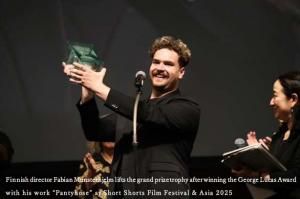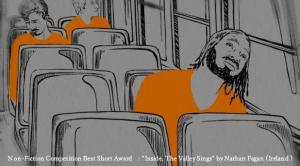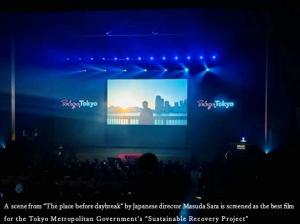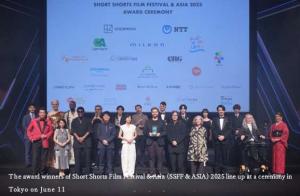
The award winners of Short Shorts Film Festival & Asia (SSFF & ASIA) 2025 line up at a ceremony in Tokyo on June 11
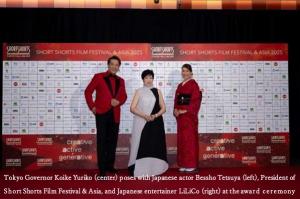
Tokyo Governor Koike Yuriko (center) poses with Japanese actor Bessho Tetsuya (left), President of Short Shorts Film Festival & Asia, and Japanese entertainer LiLiCo (right) at the award ceremony

The award winners of Short Shorts Film Festival & Asia (SSFF & ASIA) 2025 line up at a ceremony in Tokyo on June 11

Tokyo Governor Koike Yuriko (center) poses with Japanese actor Bessho Tetsuya (left), President of Short Shorts Film Festival & Asia, and Japanese entertainer LiLiCo (right) at the award ceremony
TOKYO, JAPAN, August 1, 2025 /EINPresswire.com/ -- Game-changing artificial intelligence (AI) and smartphone-friendly vertical content have found their way into Tokyo’s premier international short film festival. The annual event celebrated its 27th year with a lineup as diverse as ever, exploring new cinematic horizons.
Calling itself Short Shorts Film Festival & Asia (SSFF & ASIA), the Tokyo gala drew 4,592 submissions from 108 countries and regions this year. About 250 of them were selected and screened at physical venues from May 28 to June 11 and online for an expanded period.
https://www.shortshorts.org/index-en.php
Of the total submissions, AI helped create 275, according to SSFF & ASIA President Bessho Takuya, more than double last year’s 112. The seasoned Japanese actor and producer also notes a gradual increase in vertical format entries in the past few years.
A dozen awards were handed out at a ceremony on June 11—including the one for vertical films that was newly created in response to an emerging audience preference. The festival’s top prize, the George Lucas Award, went to a tense but hilarious 14.5-minute husband-wife drama, “Pantyhose,” by Finnish director Fabian Munsterhjelm.
AI Is ‘Not a Threat,’ Festival President Says
“AI is not a threat—it is a technology we created ourselves,” Mr. Bessho, a member of the Screen Actors Guild of America, told reporters when he called on Tokyo Governor Koike Yuriko in mid-May to prepare for the festival. He hoped the use of AI by short film creators will lead to “more diverse and profound storytelling.”
He admitted, nonetheless, “Using AI in script writing and image creation, or using generative AI to create actors. This is somewhat disconcerting because I’m an actor.”
The Tokyo Metropolitan Government has been co-hosting the Short Shorts festival, one of Asia’s largest short film festivals, since 2004. In the meeting with the festival’s supremo, Ms. Koike acknowledged recent AI-creator collaboration is “expanding new possibilities for expression.”
The festival’s website notes the increasing number of films are using AI technology as a tool for “color correction, voice-overs, detailed graphics and effects, scripts and storyboards.” On the other hand, it adds that “fewer and fewer films are being produced entirely in AI, which had been a popular topic of discussion for the past years.”
Mr. Bessho, 59, who made his Hollywood debut in the 1990 SF movie “Solar Crisis,” founded the festival in 1999 to introduce Japanese audiences to the emerging genre of short films, inspired by his personal experiences of viewing them in the United States.
About vertical formatting he told the GQ Japan magazine, “The smartphone generation may feel more at home, or at ease, with that.” “A young creator told me, ‘It’s not that we are just cutting off both sides but we’re using imagination to make up for it,’” he said. “If that’s the case, it‘d be interesting.”
The inaugural “CyberAgent Vertical Award” was won by CONECO Film, a group of Japanese creators, which claims more than 3.5 million social media followers addicted to its funny takes on human miscommunication. “We want to become a kind of bridge between cinema and social media. We will keep on creating works that will be loved by people,” CONECO director Mino Ryuichi told the Short Shorts award ceremony.
‘Anything Is Possible’ in Short Films: Grand Prize Winner
In the grand-prize winning drama “Pantyhose,” a husband and wife quarrel in the kitchen-dining room at their home when a run in her tights holds up their departure for an important gala. Tension builds up as the couple go on arguing about every aspect of their relationship.
“This work fully embraces the unique strengths of short filmmaking,” the juror panel commented. “The one-take format not only heightens the intensity but also showcases the strength of the performances and direction, making the viewer feel like a witness to a slice of real life.”
At the ceremony, Helsinki-based director Munsterhjelm, 29, called it an “amazing honor” to receive an award named after Star Wars creator George Lucas “whom I have been inspired by since I was a child.” He later tipped Japan’s Kyodo News backstage, “In feature films it feels like there are a lot of rules…how you tell a story, how long it is.” “But in short films, anything is possible.”
Also at the ceremony, Tokyo Governor Koike praised the Short Shorts festival. ”As it is short, its content is dense with emotions packed tight inside,” she said. “First and foremost, I believe this festival is becoming an event with its award winners spreading their wings from Tokyo towards the world,”
A Road to Oscars
Indeed, the Tokyo festival may pave a path to the pinnacle of global success.
In 2004, the U.S. Academy of Motion Picture Arts and Sciences accredited Short Shorts Film Festival & Asia (SSFF & ASIA) as a qualifying festival whose winners are eligible to submit for nomination in the short film category at the following year’s Academy Awards. There are some 180 Oscar-qualifying short film festivals around the world at present.
Currently, the winners of five SSFF & ASIA awards are accredited for submission to the Oscars: Live-Action International, Live-Action Asia International, Live-Action Japan, Animation and Non-Fiction.
“Pantyhose” initially won the Live Action Competition International Category Best Short Award. The Best Short Award of the Asia International Category went to "The Burning Night" by Demon Wong of Hong Kong and "Upside-Down Genius" by Nishi Ryotaro lifted the Japan title. "Inside, The Valley Sing” by Nathan Fagan of Ireland took the Non-Fiction honor and "Solstice" by Scottish director Luke Angus dominated the animation contest.
Apart from its official competitions, Short Shorts features programs and awards in a variety of genres from the environment, tourism, women to diversity and more.
For the co-hosting Tokyo Metropolitan Government, the festival provides a platform to showcase the bustling capital city’s charms and highlight its urban development initiatives.
In 2017, the “Cinematic Tokyo” competition was launched to feature subjects, recollections or creations related to the megacity of 14 million people. The “Sustainable Recovery Project” kicked off in 2022 to present Tokyo, its residents and visitors in a way to demonstrate its efforts to build a sustainable future.
Non-Fiction Award Overlaps with Real-Life Tragedy
The award ceremony bristled with emotion when Irish director Nathan Fagan dedicated his non-fiction honor to Sonia “Sunny” Jacobs who died a week earlier. One of the three ex-convicts portrayed in the work, she was killed in a house fire on June 3 at age 77.
The compelling 15-minute non-fiction combines the animated images of the convicts’ personal activities and reflections, and their real voices recorded in interviews while they were in solitary confinement for false imprisonment. Ms. Jacob was wrongfully sentenced in 1976 to death for murder. Her conviction was overturned nearly 17 years after her arrest.
“She suddenly passed away last week after a lifetime of fighting for the abolition of death penalty and fighting for the rights of the wrongfully convicted,” Mr. Fagan said. “So, yeah, this award is for Sunny.”
The non-fiction category abounded with “diverse approaches to our familiar and pressing issues such as climate change, ethnic conflicts, education and lookism,” said Japanese producer Fukuma Miyuki, a member of the juror panel.
In the 11-minute animation “Solstice,” Scottish director Luke Angus portrays the intricate details of Inuit life focused on a lonely male enduring endless summer daylight to be reunited with his lost love.
“This is a film I made myself over several years—in my spare time, in the evening and on weekends,” Mr. Angus, 34, told the ceremony, adding that in that process “you never know if it’s going to resonate with anyone.”
The Global Spotlight Award is intended for films that receive widespread global attention. It went to the UK-France co-production “MARION,” a 13-minute drama about a mother and the only female bull-dodger in France, in an environment filled with sexist biases. The film, premiered at the Venice and Toronto international film festivals last September, climaxes with Marion’s bullring debut as her little daughter sneaks out of the locker room to have a glimpse.
“We made this film away from London. We made it in France. So, to see it acknowledged and awarded in Tokyo is the greatest privilege,” said Joe Weiland, who co-directed the work with fellow Briton Finn Constantine.
Will Short Films Account for ‘One Third’ of Cinema Production?
Of Tokyo’s special Short Shorts projects, the Cinematic Tokyo category was earlier given to “Gaijin” directed by Italian filmmaker Michele Motzo. The 18-minute film consists of episodes about seven gaijin (foreigner) residents. In surreal scenes, a giant talking head looms in the night sky over Tokyo and muses over their feelings.
“This category vividly captures the very energy of Tokyo—from its sophisticated urban landscapes to the cultural and historical legacy passed down from the Edo period,” Governor Koike said last month when she selected the film for the Governor of Tokyo Award. “Edo” is the former name of Tokyo during its politically stable and culturally rich era (1603-1868) under the Tokugawa shoguns.
The Sustainable Recovery project picked 19-minute “The place before daybreak.” The drama explores the lush natural beauty of Okutama, the mountainous deep west of Tokyo, through the eyes of a young man caught up in a hard-working city life.
Invited by a senior from his university and joined by an American traveler, he camps out in Okutama, roughly 80 kilometers from the city center. After coming back on an early morning train, all refreshed, and watching the brightening horizon from a downtown canal bridge, he mutters: “I’ve never seen the Tokyo sunrise.”
About the future of short films, you may ask veteran Japanese actor Maeda Gin. He played the lead role in 24-minute drama “Letter from Astronauts” as a delivery man in his late 70s retiring from a real-life beverage maker, one of the Short-Shorts corporate sponsors.
Mr. Maeda, 81, has made his name as a sidekick in the 50 installments of a 50-year Japanese comedy movie series “It’s Tough Being a Man” (1969-2019) directed by Yamada Yoji.
“In 30 years, 50 years, short films may probably account for at least one third of cinema production,” he said at the award ceremony. “That is why I accepted the role this time. I wanted to leave my mark in short films as well.”
The SSFF & ASIA 2025 Awards and Winners:
George Lucas Award (Grand Prix): "Pantyhose" by Fabian Munsterhjelm (Finland)
Live-Action International Best Short Award: "Pantyhose" by Fabian Munsterhjelm (Finland)
Live-Action Asian International Best Short Award/Governor of Tokyo Award: "The Burning Night" by Demon Wong (Hong Kong)
Live-Action Japan Best Short Award/Governor of Tokyo Award: "Upside-Down Genius" by Nishi Ryotaro (Japan)
Non-Fiction Competition Best Short Award: "Inside, The Valley Sings" by Nathan Fagan (Ireland)
Animation Competition Best Short Award: "Solstice" by Luke Angus (Scotland)
Global Spotlight Award: “MARION” by Joe Weiland (UK) and Finn Constantine (UK)
U-25 Project Best Short Award: “Happy Valentine’s Day” by Shibata Kyu (Japan)
Shibuya Diversity Award: “Ikigai” by Trent Cooper (US)
Hoppy Happy Award: “A Walk With You” by Kouzuki Saori (Japan)
Kodansha Cinema Creators' Lab awards: “Where Seira Isn’t” by Ogata Kazutomo (Japan), “Backstage” by Furutachi Kanji (Japan) and “Husband’s Leg” by Yawata Kimi (Japan)
CyberAgent Vertical Award: A work by CONECO FILM (Japan)
Best Thrill Award supported by CRG: “ABYSS” by Nogami Tekkou (Japan)
SSFF & ASIA 2025 Highlight Movie
https://youtu.be/_-vywQzwnGw?si=YNRcWjmdBre9DyAE
Strategic PR Section, Strategic PR Division
TOKYO METROPOLITAN GOVERNMENT
email us here
Legal Disclaimer:
EIN Presswire provides this news content "as is" without warranty of any kind. We do not accept any responsibility or liability for the accuracy, content, images, videos, licenses, completeness, legality, or reliability of the information contained in this article. If you have any complaints or copyright issues related to this article, kindly contact the author above.


